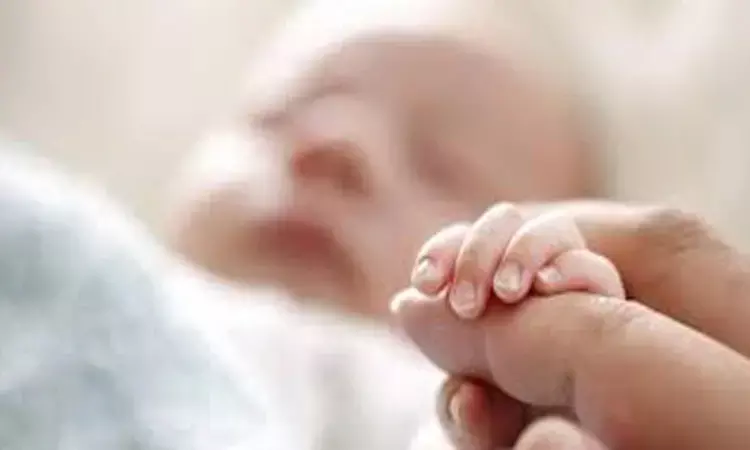- Home
- Medical news & Guidelines
- Anesthesiology
- Cardiology and CTVS
- Critical Care
- Dentistry
- Dermatology
- Diabetes and Endocrinology
- ENT
- Gastroenterology
- Medicine
- Nephrology
- Neurology
- Obstretics-Gynaecology
- Oncology
- Ophthalmology
- Orthopaedics
- Pediatrics-Neonatology
- Psychiatry
- Pulmonology
- Radiology
- Surgery
- Urology
- Laboratory Medicine
- Diet
- Nursing
- Paramedical
- Physiotherapy
- Health news
- Fact Check
- Bone Health Fact Check
- Brain Health Fact Check
- Cancer Related Fact Check
- Child Care Fact Check
- Dental and oral health fact check
- Diabetes and metabolic health fact check
- Diet and Nutrition Fact Check
- Eye and ENT Care Fact Check
- Fitness fact check
- Gut health fact check
- Heart health fact check
- Kidney health fact check
- Medical education fact check
- Men's health fact check
- Respiratory fact check
- Skin and hair care fact check
- Vaccine and Immunization fact check
- Women's health fact check
- AYUSH
- State News
- Andaman and Nicobar Islands
- Andhra Pradesh
- Arunachal Pradesh
- Assam
- Bihar
- Chandigarh
- Chattisgarh
- Dadra and Nagar Haveli
- Daman and Diu
- Delhi
- Goa
- Gujarat
- Haryana
- Himachal Pradesh
- Jammu & Kashmir
- Jharkhand
- Karnataka
- Kerala
- Ladakh
- Lakshadweep
- Madhya Pradesh
- Maharashtra
- Manipur
- Meghalaya
- Mizoram
- Nagaland
- Odisha
- Puducherry
- Punjab
- Rajasthan
- Sikkim
- Tamil Nadu
- Telangana
- Tripura
- Uttar Pradesh
- Uttrakhand
- West Bengal
- Medical Education
- Industry
Infants with sleep problems at risk for behavioral problems in later life: Study

USA: A recent study published in the Journal of Child Psychology and Psychiatry suggested a link between sleep problems during early infancy and behavioral problems later in childhood (at ages 10-11years). The findings highlight the importance of early identification and targeted intervention to identify sleep problems and promote the well-being of the child.
Recent studies have demonstrated that about 40% of children experience behavioral sleep problems including staying asleep or difficulty falling. These problems are often accompanied with behavioral health or neurodevelopmental conditions, also reduced social, psychological, academic, cognitive, and physical well-being. In particular behavioral sleep problems are linked to increased behavioral and emotional concerns.
While there has been research in this field, there remains various gaps in knowledge as only few studies have examined the sleep concerns and their relation with developmental outcomes from infancy, when behavioral sleep problems are the most prevalent. To fill this knowledge gap, Ariel A. Williamson, Division of Pulmonary Medicine, Sleep Center, Children's Hospital of Philadelphia, Philadelphia, PA, USA, and colleagues aimed to determine whether distinct sleep problem trajectories from infancy through middle childhood are associated with multiple aspects of child well-being at ages 10–11 years.
For the purpose, the researchers obtained data from the first six waves of the Longitudinal Study of Australian Children – Birth Cohort (5,107 children recruited at birth). Child sleep problems were reported by caregivers at each time point. Child well-being outcomes at ages 10–11 years were indexed using a combination of caregiver-reported, teacher-reported and child-completed tasks. Child well-being outcomes included emotional/behavioural functioning (internalizing and externalizing symptoms; self-control), health-related quality of life, cognitive skills and academic achievement.
Based on the study, the researchers found the following:
- Latent class analysis identified five distinct sleep problem trajectories over time: persistent sleep problems through middle childhood (7.7% of the sample), limited infant/preschool sleep problems (9.0%), increased middle childhood sleep problems (17.0%), mild sleep problems over time (14.4%) and no sleep problems (51.9%).
- Compared to those with no sleep problems, children with persistent sleep problems had the greatest impairments across all outcomes except cognitive skills (perceptual reasoning), with moderate to large effect sizes.
- Children with increased middle childhood sleep problems similarly experienced greater internalizing and externalizing symptoms and worse quality of life, but few academic impairments.
- Both the limited infant/preschool sleep problems and mild increases over time trajectories also showed internalizing concerns and worse caregiver-reported quality of life, although effects were smaller than the other sleep trajectories.
The researchers concluded, "the linkages between sleep problems and negative child outcomes across domains emphasizes on the importance of early identification and targeted intervention to address sleep problems and promote child well-being."
Reference:
The study titled, "Longitudinal sleep problem trajectories are associated with multiple impairments in child well-being," is published in the Journal of Child Psychology and Psychiatry.
Dr Kamal Kant Kohli-MBBS, DTCD- a chest specialist with more than 30 years of practice and a flair for writing clinical articles, Dr Kamal Kant Kohli joined Medical Dialogues as a Chief Editor of Medical News. Besides writing articles, as an editor, he proofreads and verifies all the medical content published on Medical Dialogues including those coming from journals, studies,medical conferences,guidelines etc. Email: drkohli@medicaldialogues.in. Contact no. 011-43720751


